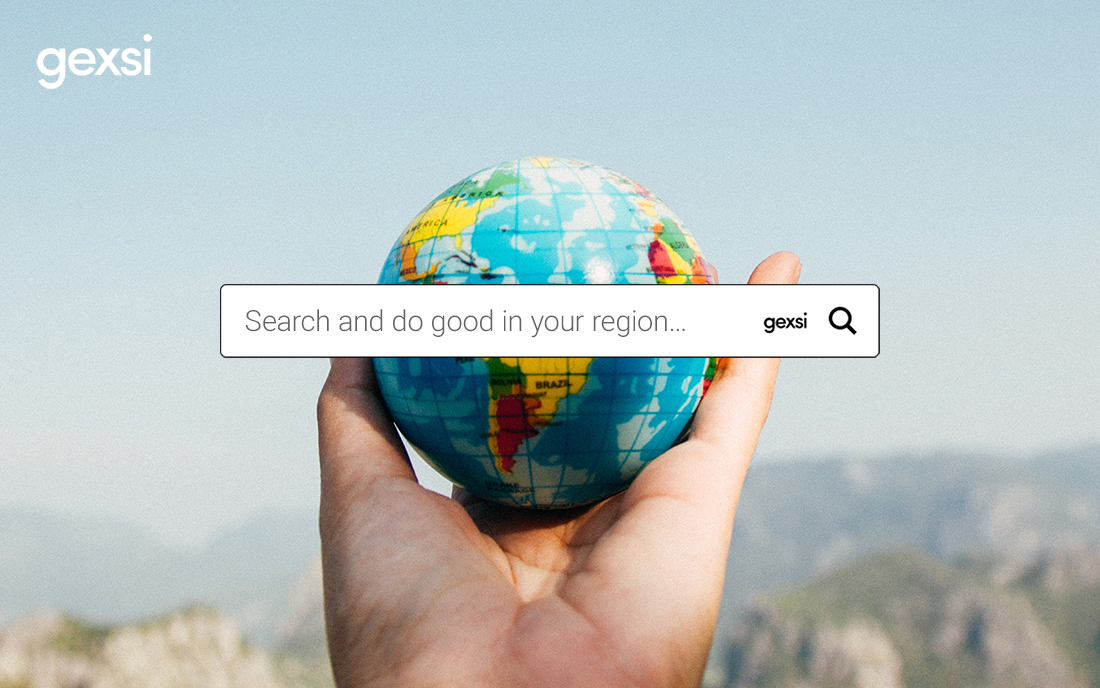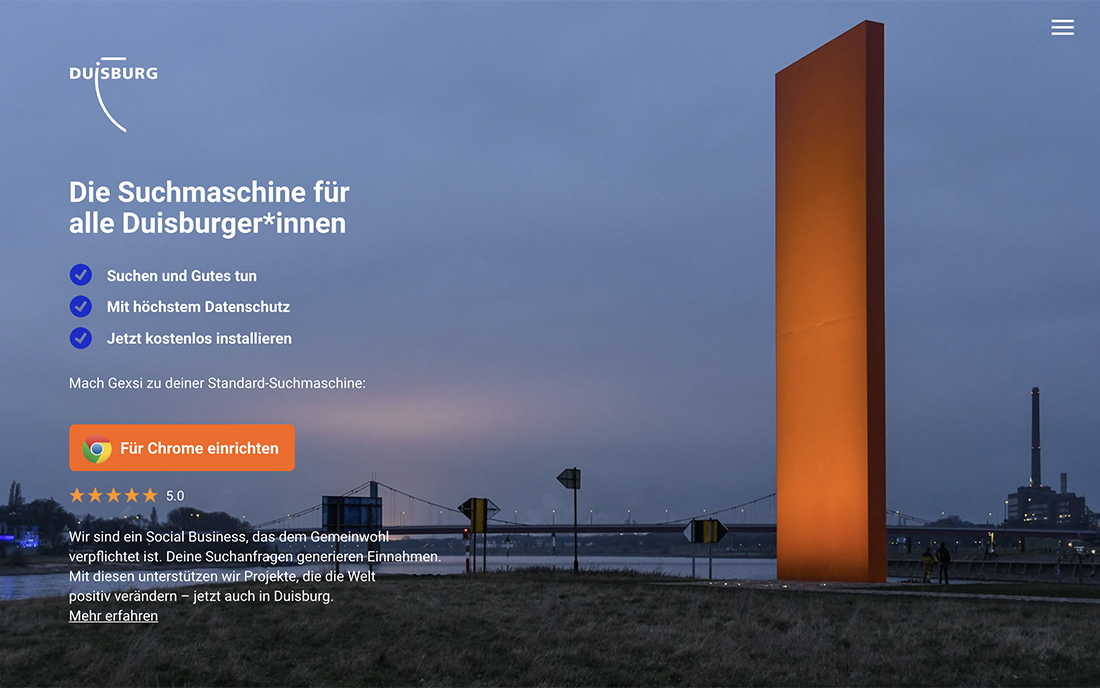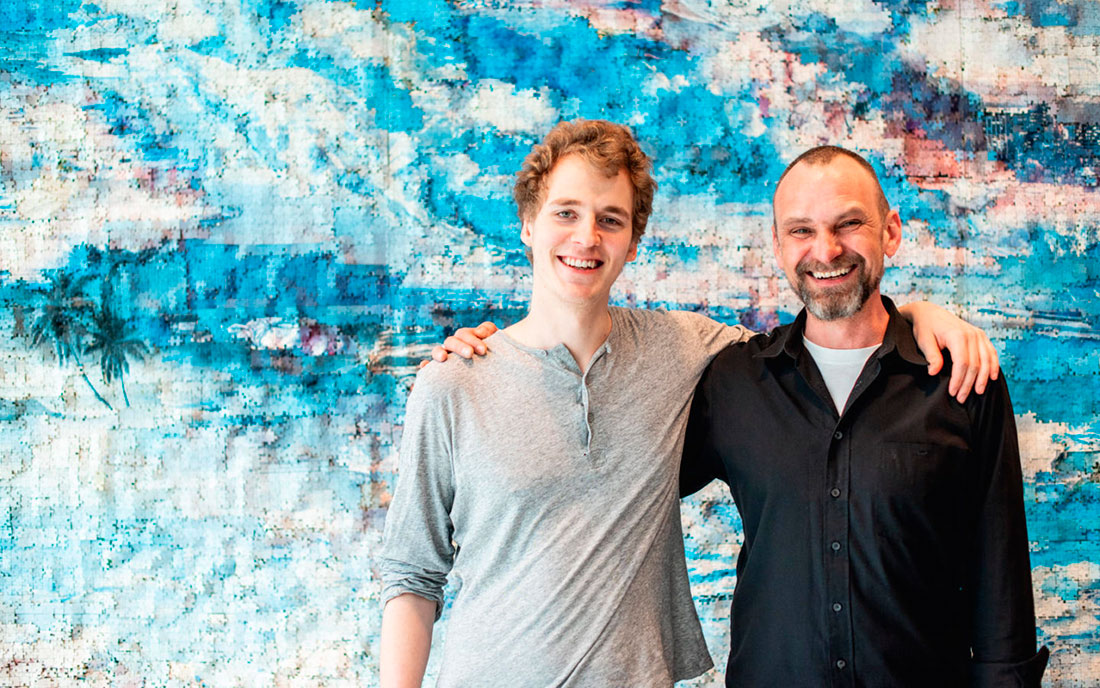How Gexsi changes the way how internet revenues are allocated

Google earns about $500 million in advertising revenue every day, but barely pays any taxes. The social search engine Gexsi offers an alternative model: It uses its search revenues to support local social projects, e.g. in the Rhine-Ruhr metropolitan area in Germany where a significant user community exists.
55.3 billion US dollars. This is how high the revenues of the internet giant Google with its more than 4 billion users were in the first quarter of 2021. Calculated down to a region with about 10 million inhabitants like the Rhine-Ruhr metropolitan region, this amounts to a solid three-digit million amount per year. A lot could be done with that if the money stayed here and was invested socially. This is not the case, of course. Google is not a non-profit. Admittedly, after an important tax loophole was closed last year, Google now pays more taxes in Europe than the alleged 3% that circulated in the media. But even this money does not flow back to the place where it was originally generated by the users’ search queries. After all, the European tax seat is in Dublin.
With Gexsi, a search engine for the common good, we want to turn the tables and give the income that each individual generates by searching the web back to the region. We have piloted how this works in practice in the Rhine-Ruhr metropolitan region. Here we show how it works.
Rhine-Ruhr metropolitan area: The city of Duisburg and the corporate sector as key drivers
It all started with a fellowship at the Impact Factory in Duisburg in 2019. Although we founded Gexsi in Berlin, with a small foothold in Freiburg im Breisgau, so not exactly close to the Ruhr region. However, the offer of an intensive mentoring programme had convinced us. Since then, we are proud that we have been able to build an increasingly strong community there.
The city of Duisburg has been using the Gexsi search engine on its computers of the 4000 employees of the city administration since late autumn. In the meantime, the municipal holdings such as the municipal housing company GEBAG or the Duisburger Versorgungs- und Verkehrsbetriebe have followed suit.
«The roll-out of Gexsi throughout the city administration over the last few months has been very well received by our staff. The result shows that we can support important social institutions and initiatives in our city with everyday searches on the internet.» Martin Murrack, City Manager and Head of Digitalisation

The city of Duisburg, with its municipal administration and the employees
of the municipal companies, is the largest supporter group in the Ruhr region so far.
Several large companies use the search as an employee engagement tool, such as Shop Apotheke or CWS, a company of the Haniel & Cie Group that develops washroom hygiene solutions. Both companies pursue an ambitious sustainability strategy.
A cooperation with the Arbeiter-Samariter-Bund Nordrhein-Westfalen, which has an enormously strong base with its 210,000 members, is about to be implemented. The youth organisation of the ASB only recently published a position paper on digitalisation. A search engine that pursues social goals in addition to data and climate protection fits this perfectly.
Six projects in the region have already been supported
Gexsi itself is still a young start-up, the revenues are still manageable. Nevertheless, several projects from the Rhine-Ruhr metropolitan region have already been supported. The support is provided both financially (through donations or participation in an ongoing crowdfunding campaign) and through accompanying media work:

Discovering Hands, Mülheim an der Ruhr
The organisation, founded by the Duisburg doctor Frank Hoffmann, trains blind people as medical assistants who, through their outstanding sense of touch, create entirely new possibilities for the early detection of breast cancer.

Tausche Bildung für Wohnen e.V. – Duisburg
The non-profit association is aimed at young adults who exchange their rent-free housing for educational support for children in disadvantaged neighbourhoods.

Forest Gum – Cologne
Most conventional chewing gums contain plastic as “chewing mass”. Forest Gum shows that there is another way and produces its sustainable, vegetable chewing gum with the sap of the chicle tree. This avoids plastic waste and protects the rainforests of Central America.

Between The Lines – Solingen
An app that offers young people help in difficult situations – free of charge and anonymously. This new form of digital youth welfare reaches everyone. The app provides answers to their questions and helps them find the right institution for their concern.

Socialbnb – Cologne
Stay with local charities worldwide: Socialbnb is an innovative travel portal that enables local initiatives to rent out unused rooms and thus reduce their dependence on donations.

Health4Bees – Duisburg
Health4Bees uses the samples collected by the bees themselves during pollination to detect environmental toxins that endanger bee colonies.
Three more model regions are under development
We are currently piloting the concept of allocating the flow of funds to the region in which they were generated, as well as the selection of innovative social projects in exchange with the regional impact community, in three further regions: Baden-Württemberg (bw.good-search.org) as well as the Alpine region with Switzerland (ch.good-search.org) and – thanks to the support of the Austrian Development Agency, the agency of the Austrian Development Cooperation – especially in Austria (austria.good-search.org).
Questions, criticism, suggestions? Write to us!
Dr. Andreas Renner, Co-Founder Gexsi: andreas@good-search.org
Become part of a community, which positively changes the world!
Set a sign and make Gexsi your search engine!
![]() Gexsi – the search engine for a better world
Gexsi – the search engine for a better world
Your search generates money for projects which make the world a better place.

